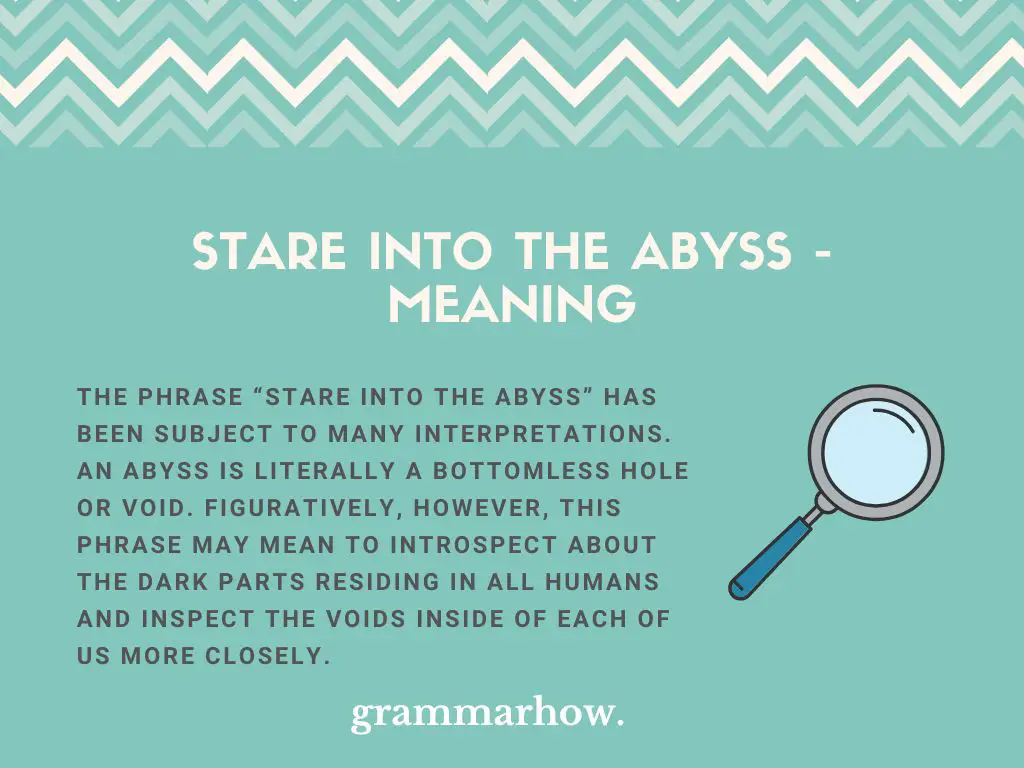If you’ve heard the phrase “stare into the abyss”, you might have found the idea rather spooky. Well, this is intended! As we’re about to find out, philosophers are pretty spooky people.
So read on to find out the origins of this phrase, as well as what it really means.
Stare Into the Abyss – Meaning
The phrase “stare into the abyss” has been subject to many interpretations. An abyss is literally a bottomless hole or void. Figuratively, however, this phrase may mean to introspect about the dark parts residing in all humans and inspect the voids inside of each of us more closely.

Human beings are complicated, multifaceted creatures, with many layers. Like an onion!
For centuries, philosophers have attempted to unpack the nature of our minds and create clarity and structure for how we should see ourselves and our place in the world.
The phrase “stare into the abyss” is one of the many metaphors for the human condition. An “abyss” is defined by the Cambridge Dictionary as “a very deep hole that seems to have no bottom”. However, it is also defined as “a difficult situation that brings trouble or destruction”.
It’s a lot to unpack, so let’s get on with it!
Stare Into the Abyss – Origin
“Stare into the abyss” is a shortened form of the full quote, “stare into the abyss and the abyss stares back at you”.
This longer version of the expression is a rewording of the original quote by Friedrich Nietzsche, which comes from his 1886 text Beyond Good and Evil: Prelude to a Philosophy of the Future:
- He who fights with monsters might take care lest he thereby become a monster. And if you gaze for long into an abyss, the abyss gazes also into you.
As such, it was originally Nietzsche himself who first said the phrase that has evolved into the current expression “stare into the abyss”.
Stare Into the Abyss – Similar Quotes
If to “stare into the abyss” means to confront the evil both around us and inside of us, a similar quote must reflect the same sentiment. Here are some examples:
- The greatest evil that one has to fight constantly, every minute of the day until one dies, is the worst part of oneself. (Patrick McGoohan)
- What is evil to one at one time, becomes good at another time to somebody else. (Mencius)
- All evil is good become cancerous. (Isaac Asimov)
- We humans have an abyss inside us. The more power people have, the greater the danger. (Helmut Kohl)
- Evil is usually attractive because evil is defiant. (Angela Carter)
Phrases That Mean the Opposite of “Stare Into the Abyss”
Since “stare into the abyss” warns about the potential triumph of evil if we engage with it for too long, opposite phrases would speak to the triumph of good over evil.
- It is by going down into the abyss that we recover the treasures of life. (Joseph Campbell)
- There is no denying that there is evil in this world, but the light will always conquer the darkness. (Idowu Koyenikan)
- Evil cannot and will not be vanquished by evil. Dark will only swallow dark and deepen. The good and the light are the keenest weapons. (Nora Roberts)
Correct Ways to Say “Stare Into the Abyss”
There are many different variations of this phrase, some of which we’ve collected below:
- Stare into the abyss and the abyss stares back.
- Stare into the abyss long enough, the abyss stares back.
- When you stare into the abyss, the abyss stares back.
- When you look into the abyss, the abyss looks back at you.
Incorrect Ways to Use “Stare Into the Abyss”
The phrase “stare into the abyss” is not meant to be taken literally. As such, it should not be treated like an instruction to find the nearest hole and stare into it indefinitely. Rather, it should be used in a figurative sense to implore others to introspect about the darkness inside them.
In What Situations Can You Use “Stare Into the Abyss”?
The phrase “stare into the abyss” is most appropriate in a context where someone is attempting to confront an evil of some kind. This could be social, political, or personal evil.
The expression reminds us that when we face evil, we must be aware of the potential for evil that resides in all of us. Despite our good intentions, if we gaze evil in the face for too long, we may empathize with it. It will gaze back at us.
In other words, the phrase must be used as a warning. We should try not to be corrupted by the very thing we are trying to confront.

Martin holds a Master’s degree in Finance and International Business. He has six years of experience in professional communication with clients, executives, and colleagues. Furthermore, he has teaching experience from Aarhus University. Martin has been featured as an expert in communication and teaching on Forbes and Shopify. Read more about Martin here.
